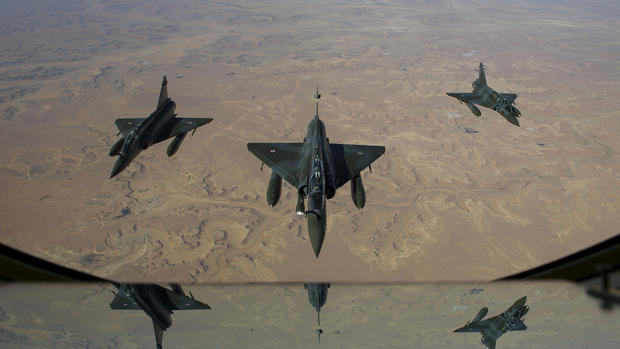Stash of weapons, rocket fire rattle Mali city
GAO, Mali Soldiers combing abandoned jihadist hideouts and sand-dusted streets for weapons have found industrial-strength explosives, raising the specter Wednesday of bomb attacks by the jihadists who fled into the desert after the arrival of French forces.
As the French began talking about a timeline for a troop drawdown, there also were growing concerns that the Islamic militants may be creeping back toward their stronghold amid reports of clashes near Gao.
France's defense minister said French troops had clashed the day before with Islamic extremists firing rocket launchers outside Gao. One of the rockets landed near a tree in a residential neighborhood.
Reports of the clashes and weapons stashes rattled residents still fearful less than two weeks after the departure of the radicals belonging to the Movement for Unity and Jihad in West Africa, or MUJAO.
In the sandy field where a rocket landed late Tuesday, people recalled how they hid in their homes.
"If a MUJAO fighter can set himself up just 10 meters (yards) from here and fire things like this at us, what's the good of the army being here?" asked Adama Younoussa, who gathered with a group of his friends in the sandy field where only a hole now remains.
"If they had hit a house, there would have been bodies here," he said.
In a trash-strewn lawn amid empty tin cans of meat and used plastic bottles, Malian soldiers warned people to stay away after heavy-duty explosives were found amid the debris.
The stash of NITRAM 5 explosives was hidden inside rice bags that were left in a communal trash area. The explosives are manufactured for use in mining, but can cause considerable damage when used as bombs.
Groups of Malian soldiers on foot were called out to several sites Wednesday, including one building where they found grenades alongside a large suitcase and reading material in Arabic script about Shariah law. At another site, they called in a bomb team after finding what appeared to be a booby-trapped vehicle.
France's defense minister, Jean-Yves Le Drian, said troops have found "preparations for a true terrorist sanctuary," including war materiel, weapons manuals and makeshift laboratories for constructing improvised explosive devices.
"It's a real war ... when we go outside of the center of cities that have been taken, we meet residual jihadists," Le Drian said Wednesday on Europe-1 radio.
French aircraft are continuing airstrikes every night on suspected militant arms depots and mine-making sites, he said.
Meanwhile, French President Francois Hollande said France may start pulling out of this vast nation in northwest Africa at the end of March.
Government spokeswoman Najat Vallaud-Belkacem said in Paris Wednesday that the withdrawal will depend on an increase in the deployment of African forces, which are meant to take over the international effort to secure Mali and help its weak army keep the peace.
The United Nations Security Council is scheduled to hold private consultations on Mali on Wednesday. The Security Council is likely to wait until the end of February to adopt a new resolution authorizing a U.N. peacekeeping force for Mali, a well-informed U.N. diplomat said, speaking on condition of anonymity because of the sensitivity of the issue.
France is expected to keep a rapid reaction force in Mali to back up the U.N. force, two U.N. diplomats said.
Gao has been held by French-led forces since late January, and there have been concerns of a counterinsurgency by remnants of the Islamic radicals belonging to MUJAO.
France launched a swift military intervention Jan. 11 against Islamist extremists who had taken over northern Mali, where they imposed a harsh version of Shariah law.
France's defense minister said hundreds of Islamic fighters have been killed, speaking Tuesday night on France BFM TV.
In Timbuktu on Wednesday, civilians handed over dozens of arms and munitions that had been abandoned by Malian troops who fled advancing rebels.
The proliferation of arms in the city of Timbuktu remains a real danger to civilians, officials and residents said.
"For every five houses that we search, we find arms in at least one," said Capt. Samba Coulibaly, spokesman for the Malian army in Timbuktu.
While the French-led forces quickly seized Timbuktu and Gao, the effort has been slower in the third provincial capital of Kidal.
A secular rebel movement fighting for a separate nation for Mali's minority Tuareg nomads claims it is holding several smaller northern towns, including Kidal, even though French and Chadian troops entered the city Tuesday.
Moussa Ag Assarid of the National Movement for the Liberation of Azawad, or NMLA, said their fighters also are holding the northeastern towns of Tessalit, Menaka, Aguelhok and Tinzawatten. Azawad is what the Tuaregs call their homeland.
Mali army national spokesman Diarran Kone refused to comment on the NMLA claims, saying only that "the re-conquest is continuing." It was not immediately possible to verify the NMLA claims. Phone networks remained down in the area.
Trouble began last year in Mali, once a stable democracy in West Africa, with the latest in a series of Tuareg rebellions in the north. The Malian army staged a coup in the faraway capital, Bamako, and in the chaos that followed, the Tuaregs and Islamic extremists made rapid advances, seizing the main cities in northern Mali. Poorly armed and demoralized Malian soldiers fled before their advance.
But the secular fighters fell out with the Islamist extremists. As the extremists have fled the French bombing campaign, it appears the NMLA fighters have moved back into some areas.
They have said they are willing to work with the French forces but not Malian troops, whom they accuse of committing reprisals against the lighter-skinned Tuaregs and Arabs.
